Y
ou went to Russia ? What's it like?Chapter 23: Innocence shattered
15 April 1633, Nürnberg
The marriage of Karl von Hohenzollern was the social occasion of the century, not least because Joseph spared no expense making certain that his beloved son had the perfect wedding. Karl's bride was a Polish princess named Felicita, and was absolutely stunning. Karl and Felicita had actually been engaged for almost three years, and had already produced a baby, named Kajetan. Kajetan was born in Warsaw in 1631, as Felicita's custom demanded. The wedding was delayed to make certain the boy was Karl's for inheritance reasons. As soon as that had been confirmed by the royal doctors, mother and child emigrated to Bayern permanently. The marriage cemented a major shift in Bavarian foreign policy, and Poland became Bayern's ally.
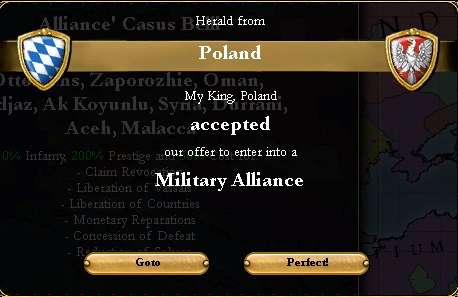
It had been years since Bayern had a powerful ally, ever since the short lived alliance with Scotland. Again, good policy was made without Joseph's input, as all the Kaiser cared about was the happiness of his son. Chancellor Maximillian, nominally of Polish heritage himself, was equally pleased, and many throughout the Holy Roman Empire rejoiced in both the wedding and the alliance. No longer could France bully the Empire without regard for the consequences.
13 November 1634, Thouars
Javier de la Rosa, over 80 years old, had seen a lot of grief in his lifetime. Yet nothing compared to the sight before him now. He had begged the Kaiser not to travel in the midst of a war with Braunschweig. However, Prinz Karl had insisted on spending his 25th birthday in Thouars, and Joseph simply couldn't deny his son anything. The war, after all, was in good hands with Marshal von Ungern and General Christoph Livizzani, a rising star in the Bavarian military.

The first warning sign that the war would not be as easy as the Kaiser had thought (or more properly the Foreign Minister, who had encouraged him) was when Norway, who had always steadfastly supported Bayern, declined the call to arms.
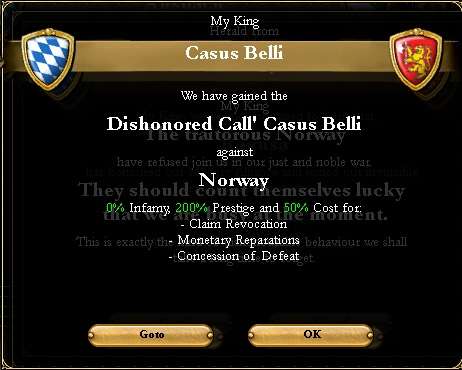
It turned out that Braunschweig had its own powerful protector: Scotland.
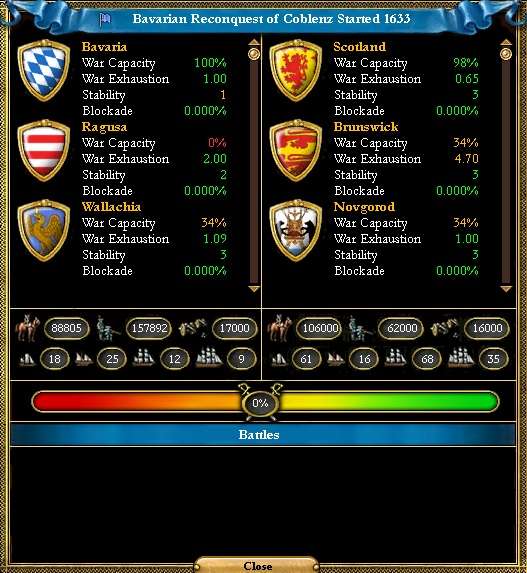
The Scottish King knew that, without a dramatic move, Braunschweig would almost certainly fail. Scotland had no desire to see a powerful and united Germany, any more than France did. The richest target, also the closest to Scotland, proved to be the very same city the royal family was traveling towards.
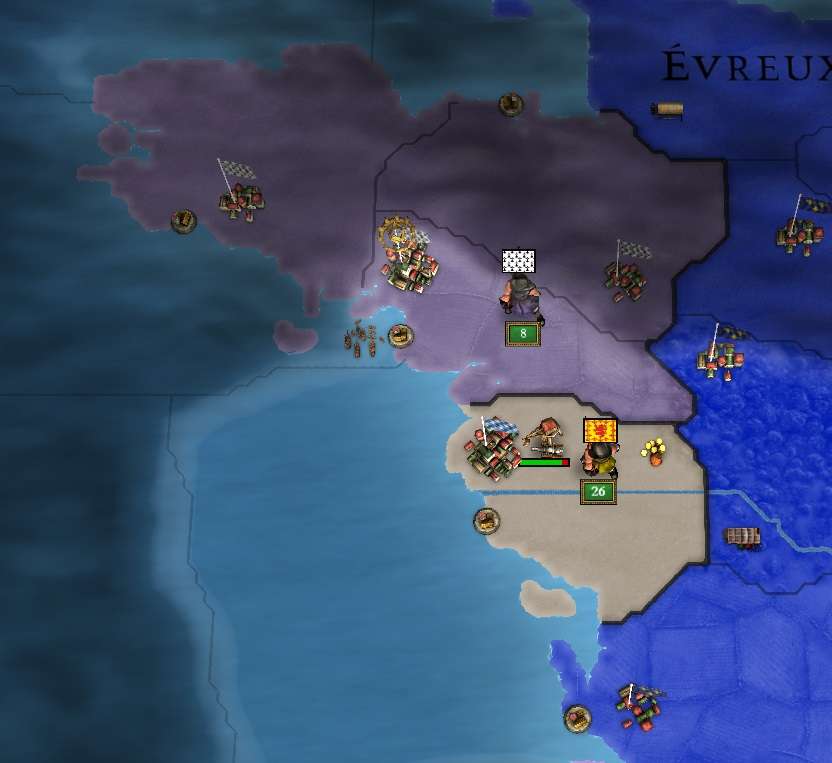
The Hohenzollerns (Joseph, Karl, Kajetan, Alarice, and their spouses) arrived in Thouars, tragically, mere days before the Scots landed. The Stadtholder of Thouars, despite the incredible wealth that the center of trade provided, chose to spend most of his time and money simply adding to his own collection of luxuries. All the Hohenzollerns huddled within the castle as the Scottish siege train battered the walls. News that far off Novgorod and Yaroslavl had surrendered did give some cause for hope to the beleaguered family.
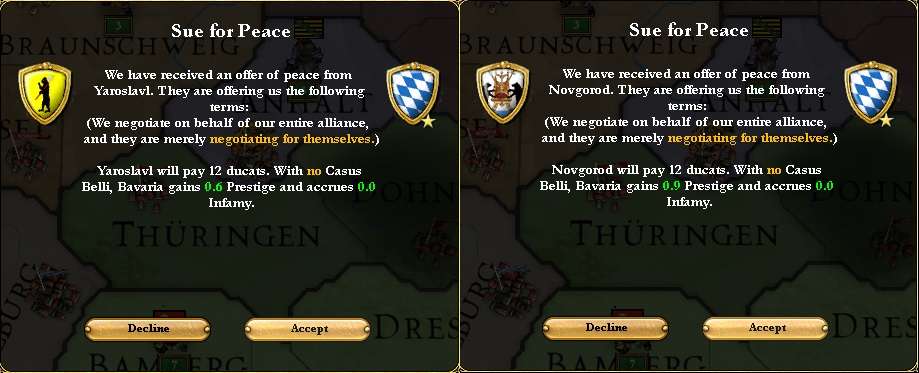
Braunschweig had lost many a fortress already to the dedicated attacks of General Livizzani. The sole Braunschweigan army was besieging Altmark. However, that was increasingly small comfort to the Hohenzollerns, as arrangements were made to spirit them back to London before a relief force could arrive. The French, surprisingly, allowed Bayern to use French roads and waterways to transport the huge armies to Thouars, but the attack would take time. Joseph was perfectly willing to simply wait, but the impetuous Karl had his own ideas. He and a small contingent of the Bavarian Guard would try to slip the Kaiser out of the city and back into Bayern. They got as far as the city limits before a Scottish regiment, drilling outside the city, caught them. They were going to return Karl home, when they were interrupted by Adelheid Babenberg. The "exile Queen" had found French politics distressingly slow, and knew that the present King of France would never attack Bayern, not while Poland was their ally. Adelheid's plan was to get a battalion of French soldiers (in reality her own private mercenaries) to kill the heir to the throne to stir up a war between France and Bayern. When the King wouldn't do it, she decided to leave France for Scotland.
As luck would have it, along with the Scottish group was another exile from Bayern: Geoffrey von Vandenburg. He immediately took to Adelheid, who was still breathtaking, and ordered his small company of Scottish soldiers to do as she asked. Unfortunately for Adelheid's plan, several Bavarian guards got away and told the Kaiser the truth. He didn't care. Joseph's sole raison d'etre had been obliterated.

Joseph barricaded himself in his room in Thouars, unwilling to leave. A few hours after getting the news, a troop of guards just barely prevented the Kaiser from killing himself with a handgun. Kajetan, the new heir to the throne, didn't move once during the scuffle. He was too busy sleeping.
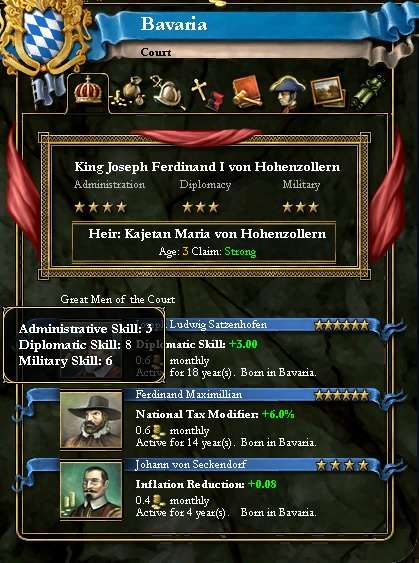
18 July 1635, Thouars
Geoffrey von Vandenburg had brought all manner of discomfort to Joseph attempting to get a surrender out of the Kaiser. Instead, all he succeeded in doing was killing the elderly Javier de la Rosa and Alarice von Hohenzollern with the terrible food and horrid conditions. Kajetan nearly died as well; Joseph would almost certainly not have noticed if he did, as his catatonia continued. He'd stopped trying to kill himself after the third attempt, but he also stopped engaging at all with anybody else. Even when news of Albrecht von Zentner's victory against Braunschweig was reported to him, he barely managed a nod.
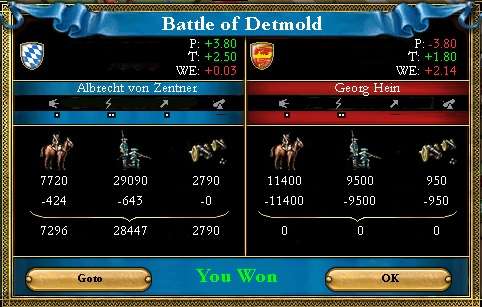
Christoph Livizzani got no better reaction upon rescuing the Kaiser. The Scottish troops had all died or been captured; Adelheid von Babenberg and Geoffrey von Vandenburg had escaped, though.

Joseph simply meekly got into the special carriage, along with his wife Antoinette (who was scarcely more animated than her husband), and drifted off to sleep. Kajetan was almost left behind before an observant guard noticed the child's absence. Christoph Livizzani took the child into his protection, without a word of protest from grandfather or grandmother.
21 November 1635, undisclosed location in Coblenz
The Conclave of Stadtholders met at a tavern in recently conquered Coblenz, knowing that none of the natives would recognize anybody. Joseph's complete paralysis actually crippled their cause, as that made Chancellor Maximillian the sole arbiter of royal power, and Ferdinand Maximillian protected it ruthlessly. Two or three Stadtholders had abandoned the Conclave altogether and a handful looked to join them in the coming months. The remaining members were torn in two directions: Ottokar Brzohobatý wanted to continue indirect pressure while Siegfried Gumpenberg, recently promoted to Hauptmann, was arguing for coup d'etat while the royal government was so weak. Siegfried was young and charismatic, and directly blamed Joseph von Hohenzollern for the suicide of his own father. It was personal for the Stadtholder von München.
Ottokar's one secret weapon was the Bavarian Catholic Church. The end of the Counter Reformation caused the Bavarian Catholic Church to turn its eyes inward, especially when one or two Bishops were also Stadtholders.
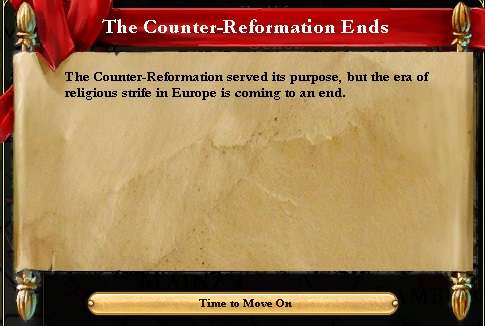
The Archbishop of Nürnberg -- a former monk named Peter -- in particular disapproved of the Conclave. Peter was Ulrich's successor, and had baptised young Kajetan, which gave him a strong connection to the Hohenzollerns. Archbishop Peter made it a point to denounce the Conclave in his weekly sermons. All seemed lost for the Conclave, until the surrender of Braunschweig.

The introduction of two new Stadtholders revitalized discussion and, for the moment, convinced Siegfried to delay his planned uprising. However, Siegfried wouldn't wait forever.
21 June 1638, Paris
Andrew Napier's choice among the delegation for the peace conference with Scotland was an incredibly savvy one by the new Foreign Minister, the younger brother of Christoph Livizzani, Leopold Ferdinand Livizzani.
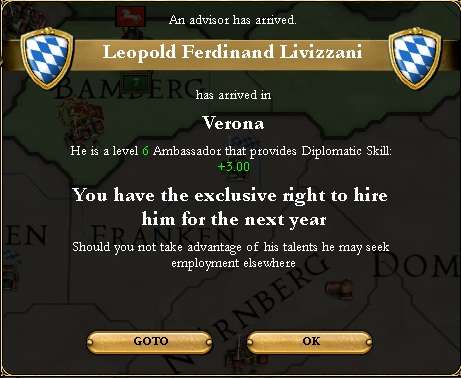
Leopold had gained the position through nepotism, but was no slouch in diplomacy. Leopold had been one of Andrew Napier's students at the University von Hohenzollern, and had indeed been well on his way to become a preeminent economist when Christoph used his promotion to General to get Leopold a job as Third Deputy Minister in Charge of Foreign Trade. Leopold's knowledge of business, language, and above all negotiation saw him rocket through the Ministry. Minister Satzenhofen particularly liked Leopold, and with the "Savior of Thouars" recommending him, Leopold's promotion was an easy one. Leopold knew his mentor, the one Scot widely trusted in Bayern, would be an indispensable part of the peace process.
Accompanying Andrew Napier was his star pupil, Vito de Frizi. Vito was born in Venice, but found republican squabbling a bore and wanted to live somewhere where he could focus entirely on academic work. He looked the part of the scholar; thin, reedy, and soft spoken. He rarely, if ever, left his small apartment across from the University. Vito was an expert on the Scottish economy, though, as well as Napier's capable subordinate. One more person rounded the delegation: Bruno Lanze, who was working on a history of the campaigns of Albrecht von Zentner in Poland, driving out the last Scottish soldiers outside of the Scottish Isles. None of the actual generals were allowed to go to France, the only semi-neutral ground that Scotland would accept to discuss peace.
Bruno sat quietly as the negotiations continued. The logistics involved in Zentner's drive to the east alone are worthy of further study, he scribbled in his notebook.
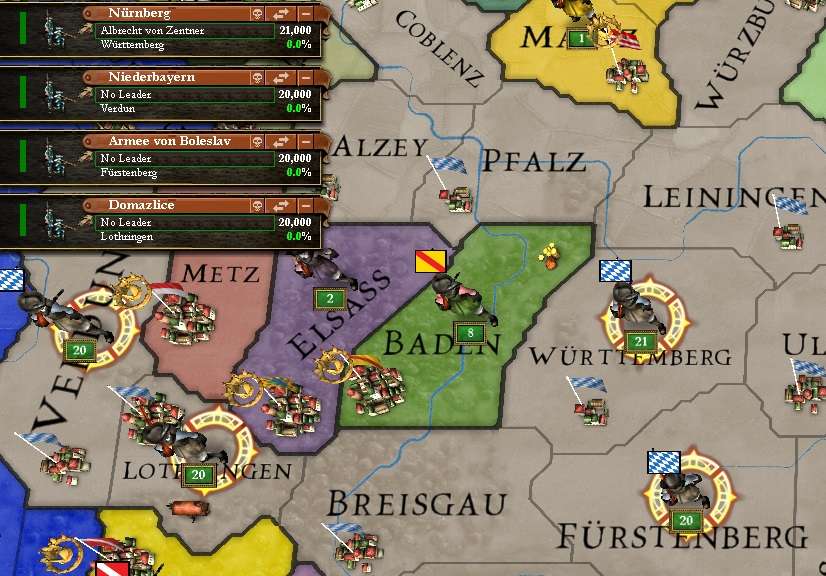
Four armies, with General Zentner in command, were sent east by Marshal von Ungern. Their objective was to try to lift Scottish pressure on Poland so that Poland could stay in the war. Lanze chewed a bit on his pencil. He looked up to see a Scottish diplomat snarling at Vito de Frizi. Vito's command of English was not excellent, and he'd inadvertently insulted some politician's mother. Bruno shook his head and continued to write. General Zentner brilliantly showed how cavalry cannot stand up to stout defense, especially at Novgorod Seversky.

Yet perhaps the most surprising hero of the Polish campaign was General Hieronymus Wilsenhütten, who absolutely obliterated a Scottish army at Pereyaslavl. His bayonet charge was a thing of beauty, and completely unexpected by the Scottish commander.
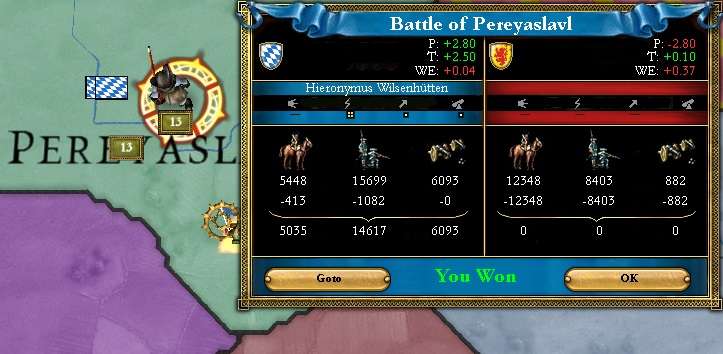
If Hieronymus is able to maintain this level of intensity, I think he will be a Marshal before all is said and done. Marshal von Ungern is a logistical genius but is uninspiring to the men. Bruno Lanze, seeing Vito getting into another foolish argument, waved the Venetian over. "Vito, do you have the copy of the Scottish treaty with Poland?"
"Yes, Herr Lanze."
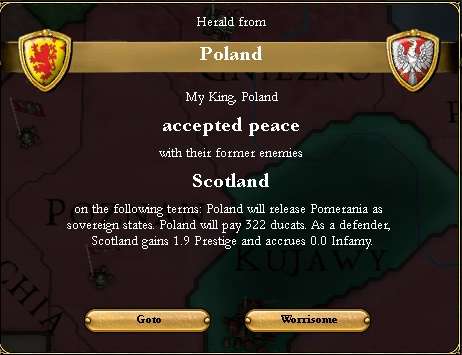
Bruno nodded sadly. "If only Poland could have shown more resistance... what do you think of General Wilsenhütten?"
Vito looked puzzled. "Um... who?"
"The one who won the war at Pereyaslavl."
"If you say so, Herr Doktor Lanze."
Bruno looked up from his book. "Vito, you are completing your doctorate soon, correct?"
"Yes. I am looking into Scottish trade practices with the New World."
"What do you plan to do with your doctorate?"
Vito now looked positively dumbfounded. "Teach, I suppose. Like Herr Doktor Napier."
Bruno sighed. "That is the extent of your ambition? Do you realize how young you are, to be in such a key position?" The Italian economist shrugged. Bruno tried another tactic. "Do you want to be important, like Herr Napier? Andrew may not have an official position in the government, but he is tremendously influential. You could be even more, if you took the time to study the world around you." Vito looked askance at Bruno Lanze. Bruno sighed again and dismissed de Frizi.
He returned to his writing and, a few minutes later, began to doze off. Andrew Napier woke him up to inform him that Scotland and Bayern had agreed to status quo ante bellum. Lanze picked up his materials and looked at Vito de Frizi, who had been writing himself with a look of intense concentration. For the third time, Hugo Lanze sighed.
20 November 1640, Nürnberg
Clemens August Asch III, Graf von Niederbayern, did not approve of his counterpart, Stadtholder von München Gumpenberg. Siegfried was moody, never once listened to the Graf with anything more than strained civility, and continued to raise his own private army of guards to "defend" the city. Graf Clemens had no formal power; that much was true. He was entitled to any number of privileges, including getting his children free education, a generous regular salary, and the right to serve at the König's pleasure in any number of key posts. But the right to rule had long since passed from the nobility, and so all Clemens could do was disapprove. Every few moments during the service for Kaiser Joseph, he stole a glance at Gumpenberg, who was always talking with one of the Stadtholders about this or that.
Clemens's gaze flicked to the French ambassador, who looked exactly as sad as he should have been. The ambassador was a long serving professional. Relations with France had improved slightly, thanks to the King of France restoring the integrity of Brabant.
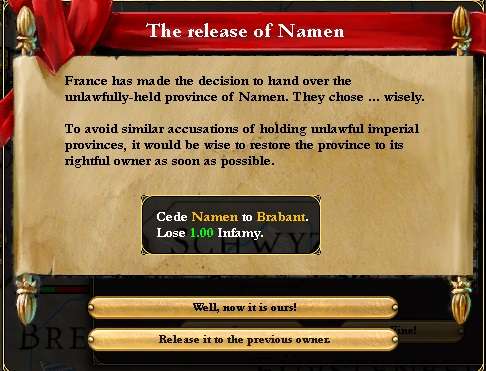
Another regular at the funeral was Katrina Rosenberg. She would turn 30 in a couple of weeks, and had been after almost every single nobleman there. She was bright, and had Clemens been single, he might have married her himself. She was currently sidling up to Vito de Frizi, apparently not realizing the Italian had no actual title apart from his noble sounding name. He watched with amusement as she seemed to realize that and immediately detached herself from his company. Clemens looked back towards the funeral service. Archbishop Peter was droning on about some obscure theological point. Chancellor Maximillian finally walked up to the Archbishop and spoke in his ear. Peter blushed and then motioned the party to the family crypt, where Joseph would join his ancestors.
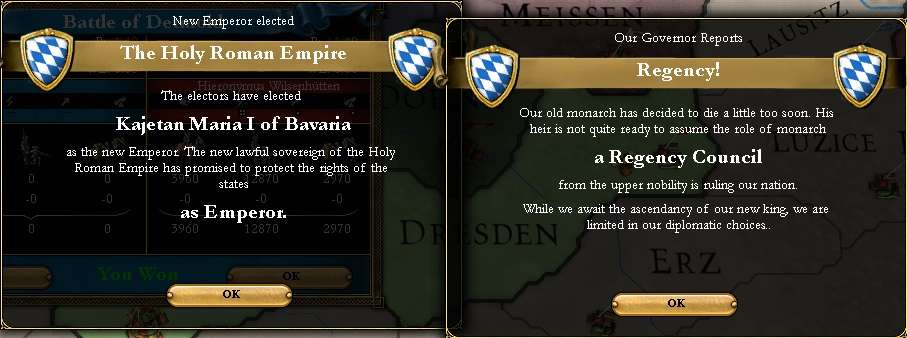
Clemens tried to find Siegfried, but he had disappeared. He went up to Marshal von Ungern, who merely noted that Hauptmann Gumpenberg had been recalled for military service against Frankfurt just a few moments ago, as had his "guards". Clemens smiled. I'm not the only one who's worried about him, then.
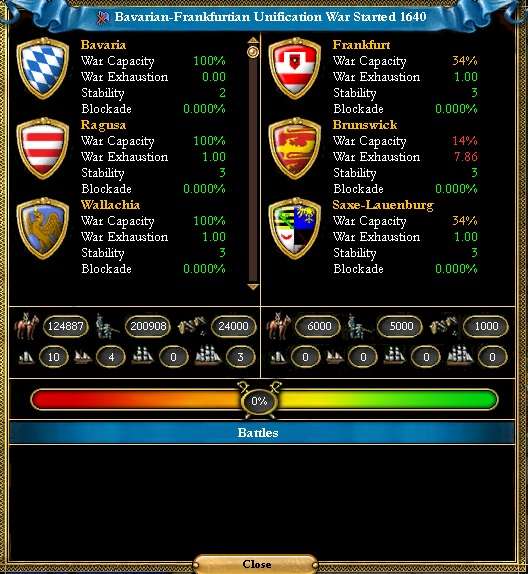
I was thinking about coming up with a cliffhanger for this update, but decided to be kind to you all.As many of you may know, I am leaving for Russia on August 1 to do some research for my dissertation. I will, eventually, have access to the internet there, but in the meantime, this AAR is on hold until I'm settled in there. Don't worry -- it isn't dead. Just suspended.

